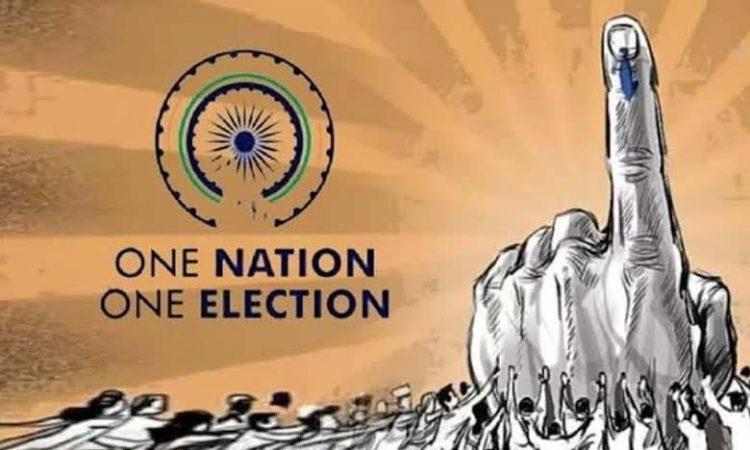(MENAFN- Kashmir Observer) Historical Context of Simultaneous Elections in India
India's tryst with simultaneous elections is not new. The country's first general elections, held between October 25, 1951, and February 21, 1952, marked the initiation of a unified electoral process, wherein Lok Sabha and state assembly elections were conducted simultaneously. The elections were conducted over a span of 100 days, reflecting the logistical complexity of managing a nation as vast and diverse as India.
Read Also
Simultaneous Polls: Parliamentary Panel Holds First Meeting
One Nation, One Election: A Flawed and Impractical Vision
However, the model faced challenges early on. The reorganization of states and the premature dissolution of many state assemblies disrupted the synchronicity of elections. Although efforts were made to sustain this system, with simultaneous elections held in 1957, 1962, and 1967, the dissolution of the Lok Sabha in 1970 and subsequent state-level disruptions led to the eventual fragmentation of this practice. By 1971, the unified electoral process had given way to staggered elections, driven by internal and external political complexities.
The Push for 'One Nation, One Election' under Modi
After a protracted hiatus, the idea of simultaneous elections has re-emerged in contemporary Indian politics, particularly under the leadership of Prime Minister Narendra Modi. In his 2019 Independence Day address, PM Modi highlighted the growing support for this initiative, drawing parallels with the successful implementation of the Goods and Services Tax (GST), branded as 'one nation, one tax.' He reiterated the need for synchronized elections during discussions with political leaders in June 2019 and emphasized its relevance during his address to the All India Presiding Officers in November 2020.
According to PM Modi, the frequent cycle of elections hampers governance by imposing recurring administrative and financial burdens. As per him, the imposition of the Model Code of Conduct (MCC) during elections often delays developmental projects, leading to escalated costs. In January 2022, Modi reaffirmed his support for 'One Nation, One Election,' arguing that a unified electoral system could streamline governance and reduce the disruptions caused by perpetual election cycles.
Federalism in jeopardy
India's federal structure is characterized by its rich diversity, encompassing a multitude of political, cultural, and linguistic landscapes. Each state has its unique set of priorities and issues, often addressed more effectively by regional parties. A synchronized electoral process risks marginalizing these regional voices, as national-level narratives may overshadow state-specific concerns. This could lead to a homogenized political discourse, undermining the pluralistic ethos of Indian democracy.
One of the primary criticisms of 'One Nation, One Election' is the potential for centralizing power at the national level. By aligning state and national elections, the influence of state governments in shaping localized policies could diminish. This centralization might erode the autonomy of state governments, challenging the principles of federalism and democratic decentralization enshrined in the Constitution.
Challenges and Concerns
Conducting simultaneous elections across a country as vast as India poses significant logistical challenges. The Election Commission would require an extensive overhaul of its infrastructure, including the procurement of additional electronic voting machines (EVMs) and the expansion of polling stations. Ensuring adequate security and administrative support during such a large-scale electoral exercise would strain existing resources and necessitate substantial financial investment.
The experience of Indonesia's unified elections in 2019 serves as a cautionary tale. Voters faced long lists of candidates, leading to higher rates of ballot errors and voter fatigue. A similar scenario in India could confuse voters, diminishing the quality of electoral participation and potentially suppressing turnout.
Synchronizing elections may exacerbate governance disruptions during the electoral period. Government resources, which should be allocated to public service delivery, often get diverted toward election-related activities. A unified election cycle would intensify this diversion, potentially hampering developmental initiatives and public welfare programs.
Moreover, political parties may manipulate the timing of state elections to coincide with favorable national cycles, prioritizing political strategy over governance and local issues. This could undermine the democratic principle of accountability, shifting the focus from performance-based governance to election-driven politics.
Tail piece:
The proposition of“One Nation, One Election” is politically impractical, administratively complex, and constitutionally unsound. Politically, it assumes consensus among diverse political parties with varying regional and ideological interests, but regional political parties have discarded this idea. They view simultaneous elections as undermining their local agendas and electoral prominence.
Administratively, managing logistics for conducting Lok Sabha and state assembly elections together across 28 states and 8 Union Territories is a colossal challenge. Issues like varying electoral terms, dissolution of assemblies, and election preparedness at different levels further complicate the proposition.
Constitutionally, the idea undermines the federal structure enshrined in the Constitution by diluting state autonomy over legislative timelines. Altering assembly tenures or dissolving legislatures prematurely strikes at the heart of
federalism.
Views expressed in the article are the author's own and do not necessarily represent the editorial stance of Kashmir Observer
The Author is a columnist and National President of J&K Students Association. He tweets at ummar_jamal and can be reached at [email protected]
Follow this link to join our WhatsApp group : Join Now




















Comments
No comment